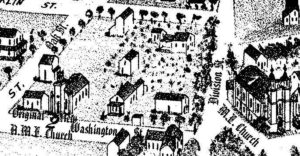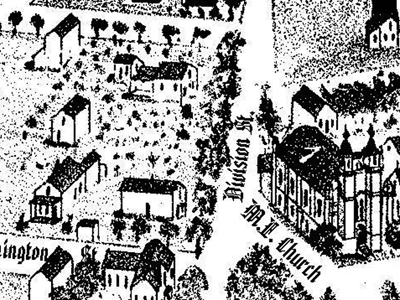By JOSEPH & JUDIE PALMER
Special to the Gazette

Since we last wrote about the potential finding of the lost African Methodist Episcopal (AME) Church of Napa from 1867 – 1892, a lot of new information has come to light creating a number of unresolved questions regarding the building, its exact location, and wither it survived. As Aaron Rice and his family were instrumental in establishing the church, we felt it necessary to attempt to answer them.
Let’s start at the beginning, from Mary Herzog’s (Napa Methodist’s Church Historian) research, J.E. Pond and his wife Amanda were pioneers of Napa and founding members of the Methodist Episcopal (ME) Church. From 1856–1860, Mr. Pond purchased land in Block 19 of Napa Abajo owning Lots 1-4.
In 1867, the African-American community purchased the 1857 church building for $600 from their white brethren of the ME Church and moved it one block onto Washington (now Randolph). (As a side note, we discovered that in the mid to late 1800’s it was commonplace in Napa (like Martinez) for buildings to be relocated. In a number of cases they were just repositioned.)
On May 4, 1867, from an article published in the Daily Evening Reporter, “Passing by that structure to-day, we found that “our colored brethren” had succeeded in moving it, about twice or thrice its breadth, from its former position. …The masons are already engaged in the foundation for the new Methodist Church.”
Mary recalled a story she had heard years ago about, “the church being moved out into the street and used for worship while the new church was being built. At the time I understood they were talking about 1916 when the 1867 church was being replaced by the present church. It really didn’t make sense that such a large church could be moved and that it would be allowed to block streets in a built up area.”
She found a number of mentions about the AME’s fundraising efforts published in the local paper, including one festival that raised $86. “It makes sense that they were still in the process of trying to purchase a permanent lot and that it took several months to accomplish that.” On October 2, 1867, the AME Trustees did purchase the “Northern half of Lot number four (4) in Block number nineteen (19) in the Town of Napa,” (next to the corner of Oak and Washington) from Mr. Pond for $250.
She also found that on November 9, 1869, Mr. Pond sold the “Southern half of Lot number (4) in Block number nineteen (19) in the Town of Napa” to Joseph and Penelope Howell. Although the 1870 census didn’t record street names, she recognized “several families surrounding the Howell family as those living between Washington and the river.”
From the 1880 census the Howells are recorded as living on Oak St. However from an 1871 “Bird’s Eye View” map of Napa, it illustrates a large church structure labeled the “Colored M.E. Church” next to a building we believe was the original ME church facing Washington not Oak. Another “Bird’s Eye View” map produced in 188? by the same publisher utilizing a different illustrator, depicts the same two buildings with the corner structure now having porches and side windows.
In 1881, the History of Napa and Lake Counties, printed and published by Slocum, Bowen & Co., regarding the AME Church states, “Now the building is the abode of bats and mice, being entirely dilapidated,” implying the church is unsafe and potentially abandoned.
Mary also found that in 1882, the Howells sold the South half of Lot 4 to James McWilliams. From other records we discovered his ownership of a number of properties throughout Napa County. If the church was unsafe as of 1881, where did the AME parishioners worship? The trustees as we know didn’t sell the land until May 9, 1893 and from the 1891 Sanborn map the larger building is gone.
According to Alexandria Brown (Napa Historian), by the 1880’s there had been a large exodus of the African-American community from Napa. Interestingly enough, a month after the AME trustees sell their property in 1893 to HH Briggs for $700, he moves into the corner house. There is no record of anyone living there after 1882 before Mr. Briggs moves in. Indicating that it could have indeed been rented by the church from Mr. McWilliams.
From the Historical Sketch of the Centenary Methodist Episcopal Church 1852-1927 published 1927, parishioner Mrs. Penelope Howell stated to Ruth Norton, “It was just one room, straight up and down boards with hard benches to sit on. But, we went to be fed with the word of the Lord, so it did not matter how we had to sit, and the one room was big enough for the 12 members of that church.” Her depiction matches the corner house, not the larger building next it.
According to Mary, “Mrs. Howell was 100 years old at the time and had been one of the founding members of the church along with Mr. & Mrs. J. E. Pond. She died at age 101, in January of 1929.” Implying that her age made her description less reliable. However, we feel the opposite since not only was Penelope a founder but she had lived next to the church for twelve years.
When we spoke to Kenneth Fish, the current resident, he recounted the story told to him from the previous owners. The house had been moved from the present location of the Methodist Church in 1866. When we were doing our research of Napa County records, an assessor who had lived in that neighborhood recalled the same story. He went on to give us an original recorded account of the structure as being nothing more than a 24’ x 24’ room. Mr. Fish concurred by stating that it obviously contained only one room, as at some point it was split in two using very thin material. In addition, the building is consistent with late 1850’s construction.
This leaves our biggest question to answer, if the smaller house is the original structure, where did the larger building come from? One potential possibility is the small building was originally moved onto the North half of Lot 4. Later a larger structure was needed, so the other was moved to the Southern half of Lot 4 to make room to build the bigger church.
The problem is currently we don’t have any documentation to back this up but there are tax records of the AME Church currently misplaced (due to the 2014 earthquake) that could help to answer these questions. Stay tuned…
The authors of this column would very much like to thank Mary Herzog, Alexandria Brown, Kenneth Fish, Presley Hubschmitt, Nancy Levenberg, John Tuteur and his amazing staff for their generous support, help with our research and collaboration.
To find out more about Martinez and Contra Costa County history:
Martinez Museum – 1005 Escobar Street, corner of Court Street. Open Tues and Thurs 11:30 a.m. to 3p.m. First 4 Sundays 1-4 p.m. 925-228-8160; www.martinezhistory.org.
Contra Costa County History Center – 610 Main Street, Martinez. Open Tues through Thurs, 9 a.m. to 4 p.m.; 3rd Saturdays, 10 a.m. to 2 p.m. 925-229-1042; www.cocohistory.com
For more information on the Martinez Historical Society’s – Potter’s Field Restoration Project, please visit our website MartinezCemetery.org. Do you have a Potter’s Field resident story to tell? We welcome any pictures or information on anyone or anything regarding Potter’s Field. Please email us at martinezcemetery@gmail.com or call us at (925) 335-9396.





